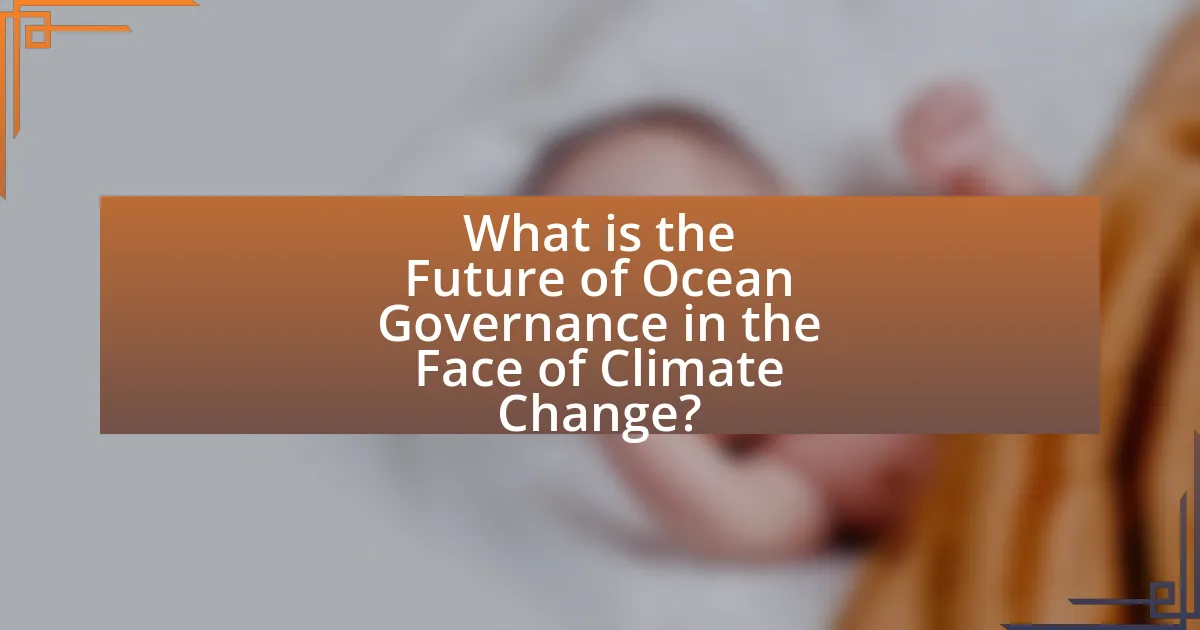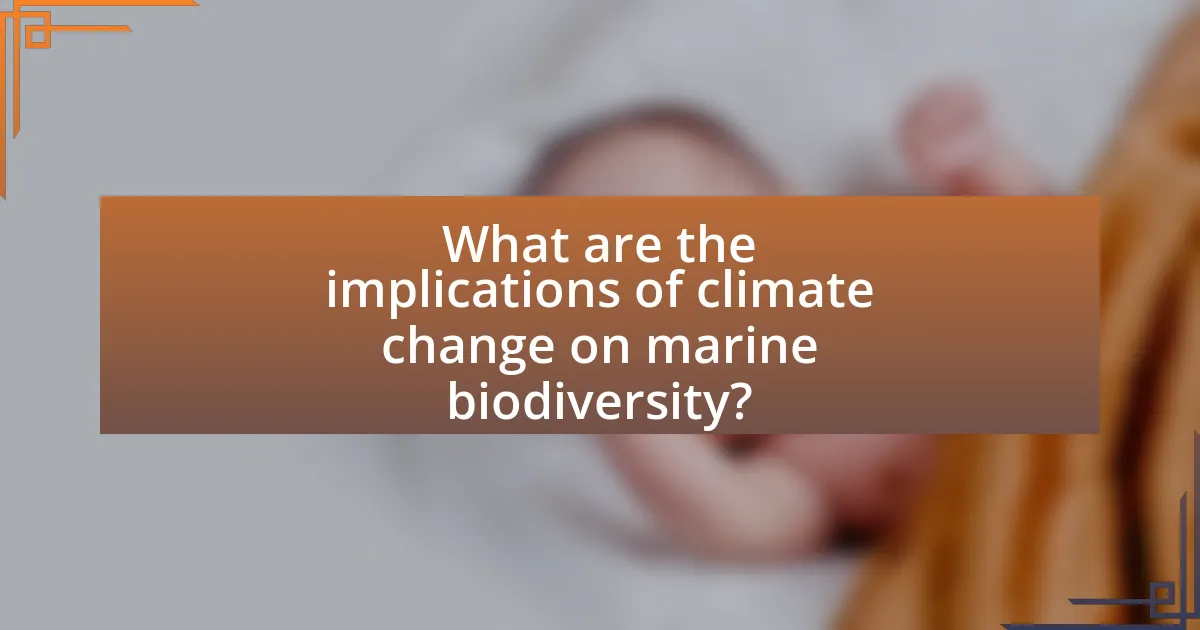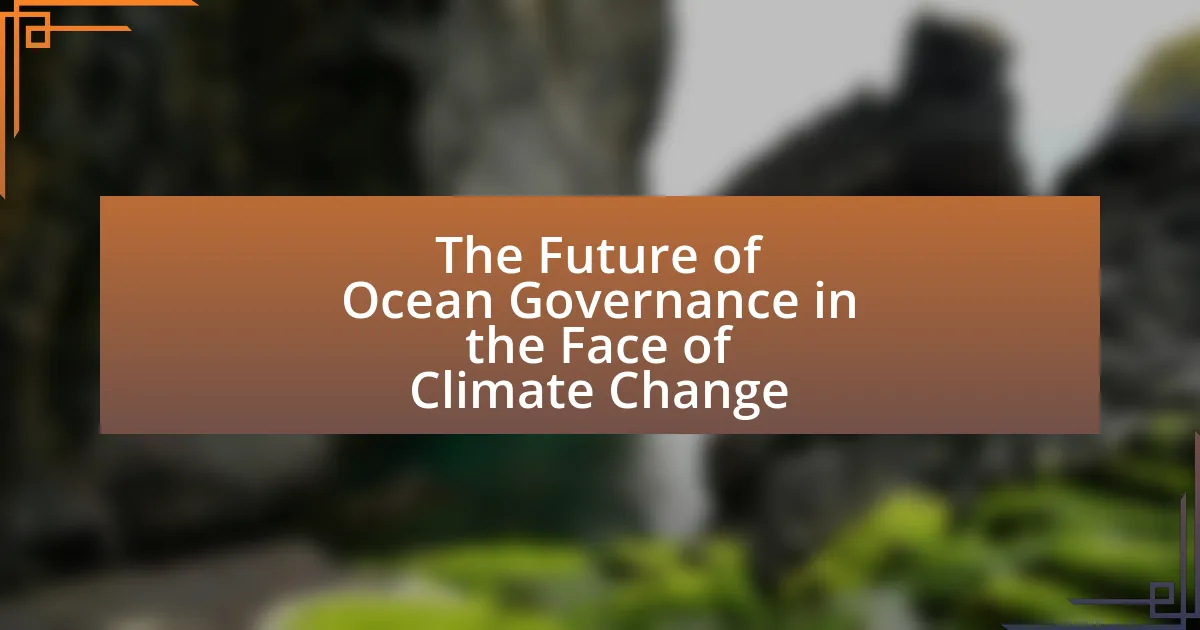The article examines the future of ocean governance in the context of climate change, emphasizing the need for adaptive management strategies that incorporate scientific research, stakeholder engagement, and international cooperation. It highlights the significant impacts of climate change on marine ecosystems, including rising sea temperatures, ocean acidification, and sea level rise, which complicate existing governance frameworks. Key principles of effective ocean governance, such as sustainability and stakeholder participation, are discussed alongside the role of international laws and local communities in shaping governance practices. The article also explores innovative approaches and technologies that can enhance governance effectiveness and address the challenges posed by climate change on marine biodiversity and ecosystems.

What is the Future of Ocean Governance in the Face of Climate Change?
The future of ocean governance in the face of climate change will increasingly focus on adaptive management strategies that integrate scientific research, stakeholder engagement, and international cooperation. As climate change continues to impact marine ecosystems, governance frameworks must evolve to address challenges such as ocean acidification, rising sea levels, and shifting fish populations. For instance, the Intergovernmental Panel on Climate Change (IPCC) reports indicate that ocean temperatures have risen significantly, affecting biodiversity and fisheries, necessitating a collaborative approach among nations to manage shared resources effectively. Additionally, initiatives like the United Nations’ Sustainable Development Goal 14 emphasize the importance of conserving and sustainably using the oceans, which will guide future governance efforts.
How is climate change impacting ocean governance?
Climate change is significantly impacting ocean governance by altering marine ecosystems, which complicates regulatory frameworks. Rising sea temperatures and ocean acidification are leading to shifts in species distribution, necessitating adaptive management strategies to address these changes. For instance, the Intergovernmental Panel on Climate Change (IPCC) reports that over 30% of marine species are at risk due to climate-related stressors, prompting the need for updated governance policies that can accommodate these dynamic conditions. Additionally, climate change exacerbates issues such as overfishing and habitat destruction, which further challenges existing governance structures to effectively manage ocean resources sustainably.
What specific challenges does climate change pose to ocean ecosystems?
Climate change poses significant challenges to ocean ecosystems, primarily through rising sea temperatures, ocean acidification, and sea level rise. Rising sea temperatures disrupt marine species’ habitats, leading to shifts in biodiversity and the potential collapse of fish populations, as evidenced by studies showing that warmer waters can reduce fish catch by up to 30% in some regions. Ocean acidification, caused by increased carbon dioxide absorption, negatively impacts calcifying organisms like corals and shellfish, which are vital for marine food webs; research indicates that coral reefs could decline by 70-90% if current trends continue. Additionally, sea level rise threatens coastal habitats, such as mangroves and salt marshes, which serve as critical nurseries for many marine species, with projections estimating that up to 1 billion people could be displaced by rising seas by 2050.
How do rising sea levels affect coastal governance?
Rising sea levels significantly impact coastal governance by necessitating the adaptation of policies and regulations to address increased flooding, erosion, and habitat loss. Coastal governance frameworks must evolve to incorporate strategies for managing land use, infrastructure development, and environmental protection in response to these changes. For instance, the National Oceanic and Atmospheric Administration (NOAA) reports that sea levels along the U.S. coast have risen by an average of 8 inches since 1880, prompting local governments to revise zoning laws and invest in resilient infrastructure to mitigate risks. This adaptation is crucial for protecting communities and ecosystems, demonstrating that effective coastal governance must integrate scientific data and stakeholder engagement to address the challenges posed by rising sea levels.
What are the key principles of ocean governance?
The key principles of ocean governance include sustainability, precautionary approach, integrated management, and stakeholder participation. Sustainability ensures that ocean resources are used in a way that meets current needs without compromising future generations. The precautionary approach advocates for preventive measures when there is uncertainty about potential environmental harm, emphasizing the need to act before damage occurs. Integrated management promotes a holistic view of ocean ecosystems, recognizing the interconnectedness of marine and coastal environments, while stakeholder participation involves engaging various groups, including local communities, governments, and industries, in decision-making processes to ensure diverse perspectives and interests are considered. These principles are essential for effective governance, particularly in addressing challenges posed by climate change, as they foster resilience and adaptive capacity in ocean management.
How do international laws and agreements shape ocean governance?
International laws and agreements significantly shape ocean governance by establishing frameworks for the sustainable management and protection of marine resources. For instance, the United Nations Convention on the Law of the Sea (UNCLOS) provides guidelines for maritime boundaries, resource allocation, and environmental protection, influencing how nations interact with ocean ecosystems. Additionally, agreements like the Paris Agreement compel countries to address climate change impacts on oceans, promoting collaborative efforts to mitigate risks such as ocean acidification and rising sea levels. These legal instruments create binding obligations and cooperative mechanisms that enhance accountability and foster international collaboration, thereby directly impacting ocean governance practices.
What role do local communities play in ocean governance?
Local communities play a crucial role in ocean governance by contributing traditional ecological knowledge, participating in decision-making processes, and implementing sustainable practices. Their involvement ensures that governance frameworks are culturally relevant and effective in managing marine resources. For instance, studies have shown that local fishing communities often possess extensive knowledge about local ecosystems, which can enhance conservation efforts and inform policy decisions. Additionally, community-led initiatives, such as marine protected areas, have been successful in various regions, demonstrating the effectiveness of local stewardship in promoting biodiversity and resilience against climate change impacts.
Why is adaptive governance important for oceans?
Adaptive governance is important for oceans because it enables flexible and responsive management strategies that can address the dynamic challenges posed by climate change and human activities. This approach allows for the integration of scientific knowledge, stakeholder input, and adaptive management practices, which are essential for sustaining marine ecosystems. For instance, research indicates that adaptive governance frameworks can enhance resilience in marine environments by facilitating timely responses to environmental changes, such as shifts in fish populations due to warming waters. By promoting collaboration among various stakeholders, adaptive governance also ensures that diverse perspectives are considered, leading to more effective and equitable ocean management.
What strategies can be employed to enhance adaptive governance?
To enhance adaptive governance, strategies such as stakeholder engagement, flexible policy frameworks, and continuous monitoring and evaluation can be employed. Stakeholder engagement ensures that diverse perspectives are included in decision-making, which is crucial for addressing complex issues like climate change. Flexible policy frameworks allow for adjustments in response to new information or changing conditions, facilitating timely responses to emerging challenges. Continuous monitoring and evaluation provide data-driven insights that inform governance practices, enabling adaptive management of ocean resources. These strategies are supported by research indicating that inclusive and responsive governance structures are more effective in managing environmental changes (Berkes, 2009; Folke et al., 2005).
How can stakeholder engagement improve governance outcomes?
Stakeholder engagement can improve governance outcomes by fostering collaboration, enhancing transparency, and ensuring that diverse perspectives are considered in decision-making processes. When stakeholders, including local communities, businesses, and environmental organizations, actively participate in governance, they contribute valuable insights that lead to more effective policies. For instance, research by the World Resources Institute indicates that inclusive stakeholder engagement can lead to better environmental management and more sustainable outcomes, as it aligns governance strategies with the needs and knowledge of those directly affected by policies. This collaborative approach not only builds trust among stakeholders but also increases the legitimacy and acceptance of governance decisions, ultimately resulting in more resilient and adaptive governance frameworks in the context of climate change.
How can we transition from current governance models to future-ready frameworks?
To transition from current governance models to future-ready frameworks, stakeholders must adopt adaptive management strategies that incorporate scientific data and stakeholder engagement. This approach allows for real-time adjustments to governance practices based on environmental changes and socio-economic factors. For instance, the implementation of Integrated Coastal Zone Management (ICZM) has shown effectiveness in balancing ecological health with human activity, as evidenced by its application in various countries, which has led to improved resilience against climate impacts. Additionally, fostering collaboration among governments, NGOs, and local communities can enhance the governance framework, as demonstrated by the success of multi-stakeholder initiatives in marine conservation.
What innovations are emerging in ocean governance?
Innovations emerging in ocean governance include the implementation of digital technologies such as satellite monitoring and blockchain for tracking marine resources. These technologies enhance transparency and accountability in fisheries management, as evidenced by the Global Fishing Watch initiative, which utilizes satellite data to monitor fishing activities in real-time. Additionally, integrated ocean management frameworks are being developed to address multiple ocean uses and environmental impacts, promoting sustainable practices. The establishment of marine protected areas (MPAs) is also gaining traction, with over 7% of the world’s oceans currently designated as MPAs, aimed at conserving biodiversity and enhancing resilience against climate change.

What are the implications of climate change on marine biodiversity?
Climate change significantly threatens marine biodiversity by altering habitats, disrupting ecosystems, and increasing species extinction rates. Rising ocean temperatures lead to coral bleaching, which affects the biodiversity of coral reefs that support numerous marine species. Additionally, ocean acidification, caused by increased carbon dioxide absorption, negatively impacts shellfish and other calcifying organisms, further destabilizing marine food webs. According to the Intergovernmental Panel on Climate Change (IPCC), approximately 30% of marine species are at risk of extinction due to climate-related changes. These implications highlight the urgent need for effective ocean governance to mitigate the impacts of climate change on marine ecosystems.
How does climate change affect marine species and habitats?
Climate change significantly impacts marine species and habitats by altering ocean temperatures, acidifying waters, and disrupting ecosystems. Rising sea temperatures lead to coral bleaching, which affects biodiversity as many marine species depend on coral reefs for habitat and food. Ocean acidification, resulting from increased carbon dioxide absorption, negatively affects shellfish and other calcifying organisms, threatening their survival and the species that rely on them. Additionally, shifting ocean currents and changing salinity levels can disrupt migration patterns and breeding grounds, further endangering marine life. According to the Intergovernmental Panel on Climate Change (IPCC), these changes could lead to a decline in fish populations and the collapse of marine ecosystems, highlighting the urgent need for effective ocean governance to mitigate these impacts.
What are the consequences of ocean acidification on marine life?
Ocean acidification significantly impacts marine life by altering the chemical composition of seawater, which affects organisms that rely on calcium carbonate for their shells and skeletons. Species such as corals, mollusks, and certain plankton struggle to maintain their structures in more acidic conditions, leading to decreased survival rates and disrupted ecosystems. Research indicates that ocean acidity has increased by approximately 30% since the beginning of the Industrial Revolution, which correlates with declining populations of shellfish and coral reefs, vital components of marine biodiversity and fisheries.
How do temperature changes impact species distribution?
Temperature changes significantly impact species distribution by altering habitat suitability and food availability. As global temperatures rise, many marine and terrestrial species are shifting their ranges toward cooler areas, often poleward or to higher elevations. For instance, research published in “Nature Climate Change” by Poloczanska et al. (2013) indicates that marine species have moved an average of 72 kilometers toward the poles over the last 40 years due to warming ocean temperatures. This shift can disrupt existing ecosystems, as species that rely on specific temperature ranges for breeding, feeding, and survival may find their habitats unsuitable, leading to declines in biodiversity and changes in community structure.
What role does technology play in ocean governance?
Technology plays a crucial role in ocean governance by enhancing monitoring, data collection, and decision-making processes. Advanced technologies such as satellite remote sensing, autonomous underwater vehicles, and data analytics enable real-time tracking of ocean conditions, biodiversity, and human activities. For instance, satellite systems can monitor illegal fishing activities and track changes in sea temperature, which is vital for managing marine resources effectively. Additionally, data-driven models support policymakers in assessing the impacts of climate change on marine ecosystems, facilitating informed governance strategies. These technological advancements are essential for sustainable ocean management and ensuring compliance with international regulations.
How can data collection and monitoring improve governance?
Data collection and monitoring can significantly improve governance by providing accurate, real-time information that informs decision-making processes. This enhanced data availability allows policymakers to identify trends, assess the effectiveness of regulations, and respond promptly to emerging issues. For instance, the Global Ocean Observing System (GOOS) collects data on ocean conditions, which helps governments understand climate change impacts on marine ecosystems and develop adaptive management strategies. Furthermore, studies show that countries with robust data collection frameworks experience better compliance with environmental regulations, leading to more sustainable governance practices.
What technological innovations are being used to combat climate change effects?
Technological innovations being used to combat climate change effects include renewable energy systems, carbon capture and storage (CCS), and advanced agricultural practices. Renewable energy systems, such as solar and wind power, significantly reduce greenhouse gas emissions by providing clean energy alternatives; for instance, solar energy has seen a 20-fold increase in capacity globally from 2010 to 2020. Carbon capture and storage technology captures up to 90% of carbon dioxide emissions from sources like power plants, preventing it from entering the atmosphere. Additionally, advanced agricultural practices, including precision farming and vertical farming, enhance food production efficiency while minimizing environmental impact, with precision agriculture reducing fertilizer use by up to 30%. These innovations collectively contribute to mitigating climate change effects and promoting sustainable practices.

What are the best practices for future ocean governance?
The best practices for future ocean governance include implementing integrated management approaches, enhancing international cooperation, and promoting sustainable practices. Integrated management approaches, such as ecosystem-based management, ensure that all aspects of ocean health are considered, leading to more effective decision-making. Enhanced international cooperation is crucial, as oceans are transboundary resources; agreements like the United Nations Convention on the Law of the Sea facilitate collaborative governance. Promoting sustainable practices, such as responsible fishing and marine protected areas, helps preserve biodiversity and ecosystem services. These practices are supported by evidence from various studies, including the Intergovernmental Panel on Climate Change reports, which highlight the need for coordinated efforts to address climate impacts on marine environments.
How can policymakers effectively address climate change in ocean governance?
Policymakers can effectively address climate change in ocean governance by implementing integrated management strategies that prioritize ecosystem resilience and sustainable practices. These strategies should include establishing marine protected areas (MPAs) to safeguard biodiversity, promoting sustainable fisheries management to prevent overfishing, and enhancing coastal zone management to mitigate the impacts of sea-level rise. Evidence shows that MPAs can lead to a 20-50% increase in fish biomass, which supports both ecological health and local economies. Additionally, the Intergovernmental Panel on Climate Change (IPCC) emphasizes the need for adaptive governance frameworks that incorporate scientific research and stakeholder engagement to ensure that policies remain effective in the face of changing ocean conditions.
What collaborative approaches can enhance governance effectiveness?
Collaborative approaches that can enhance governance effectiveness include multi-stakeholder partnerships, integrated coastal zone management, and participatory decision-making processes. Multi-stakeholder partnerships bring together governments, NGOs, and local communities to share resources and knowledge, which has been shown to improve policy outcomes in ocean governance. Integrated coastal zone management promotes collaboration across different sectors and levels of government, facilitating a holistic approach to managing coastal resources, as evidenced by successful initiatives in countries like Australia and the Netherlands. Participatory decision-making processes empower local communities by involving them in governance, leading to more sustainable and accepted outcomes, as demonstrated in various fisheries management cases worldwide.
How can education and awareness contribute to better governance?
Education and awareness significantly enhance governance by equipping citizens with the knowledge necessary to engage in informed decision-making and advocacy. When individuals understand the complexities of issues such as climate change and ocean governance, they are more likely to participate in democratic processes, hold leaders accountable, and support sustainable policies. For instance, studies show that increased public awareness about environmental issues leads to greater community involvement in conservation efforts, which can influence policy changes at local and national levels. Furthermore, educational programs that focus on the importance of ocean health can foster a culture of stewardship, encouraging individuals to take action that aligns with better governance practices.
What steps can individuals take to support ocean governance efforts?
Individuals can support ocean governance efforts by actively participating in local conservation initiatives and advocating for sustainable practices. Engaging in beach clean-ups and supporting organizations focused on marine protection directly contributes to healthier ocean ecosystems. Additionally, individuals can reduce plastic consumption and promote recycling, which helps mitigate pollution that affects marine life. Educating themselves and others about the importance of ocean health fosters a community that values sustainable governance. Supporting policies that protect marine environments, such as marine protected areas, further strengthens governance efforts. Research indicates that community involvement in conservation leads to more effective management of marine resources, as seen in successful initiatives worldwide.
